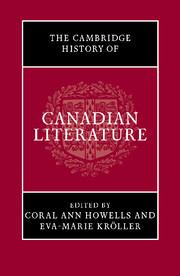Book contents
- Frontmatter
- Introduction
- PART ONE OLD AND NEW WORLD, LA NOUVELLE-FRANCE, THE CANADAS, DOMINION OF CANADA
- PART TWO THE POST-CONFEDERATION PERIOD
- PART THREE MODELS OF MODERNITY, POST-FIRST WORLD WAR
- PART FOUR AESTHETIC EXPERIMENTS, 1960 AND AFTER
- 18 Quartet: Atwood, Gallant, Munro, Shields
- 19 The short story
- 20 Canadian drama: performing communities
- 21 Poetry
- 22 Poetry, drama, and the postmodern novel
- 23 Comic art and bande dessinée: from the funnies to graphic novels
- 24 “Ghost stories”: fictions of history and myth
- 25 Indigenous writing: poetry and prose
- 26 Contemporary Aboriginal theater
- 27 Transcultural life-writing
- 28 Multiculturalism and globalization
- PART FIVE WRITING IN FRENCH
- Bibliography
- Index
- References
22 - Poetry, drama, and the postmodern novel
from PART FOUR - AESTHETIC EXPERIMENTS, 1960 AND AFTER
Published online by Cambridge University Press: 28 September 2010
- Frontmatter
- Introduction
- PART ONE OLD AND NEW WORLD, LA NOUVELLE-FRANCE, THE CANADAS, DOMINION OF CANADA
- PART TWO THE POST-CONFEDERATION PERIOD
- PART THREE MODELS OF MODERNITY, POST-FIRST WORLD WAR
- PART FOUR AESTHETIC EXPERIMENTS, 1960 AND AFTER
- 18 Quartet: Atwood, Gallant, Munro, Shields
- 19 The short story
- 20 Canadian drama: performing communities
- 21 Poetry
- 22 Poetry, drama, and the postmodern novel
- 23 Comic art and bande dessinée: from the funnies to graphic novels
- 24 “Ghost stories”: fictions of history and myth
- 25 Indigenous writing: poetry and prose
- 26 Contemporary Aboriginal theater
- 27 Transcultural life-writing
- 28 Multiculturalism and globalization
- PART FIVE WRITING IN FRENCH
- Bibliography
- Index
- References
Summary
“Generic instability is undeniably a fundamental characteristic of postmodern writing,” as Marta Dvořák argues. Given this instability, one might assume that genre theory no longer functions as a useful tool for interpreting the novel. However, Fredric Jameson argues that traditional genres do not disappear from postmodern fiction, so much as resurface in dissonant states of juxtaposition. Genre analysis takes on a heightened importance in this context because it illuminates the complex ways in which authors break down literary codes and force readers to negotiate overlapping frames of generic and cultural reference. This intersection of formal and cultural concerns can be illustrated by surveying two prominent traditions of crossgenre experimentation in Canada. The first combines lyric with novelistic techniques, while the second, which evolves from a different set of circumstances, yet enters into dialogue with the poet-novelist tradition, adapts dramatic devices to the novel. By compelling these dissimilar genres to intermingle, the authors illustrate how cultures interact in Canada through form as well as declarative statements.
Leonard Cohen
The work of Leonard Cohen exemplifies the poet-novelist phenomenon. A student of the novelist Hugh MacLennan at McGill University, and a Jewish writer in English who revered the poet-novelist A. M. Klein as a surrogate father figure, Cohen produced two landmark novels about crossing cultural solitudes in the 1960s. The Favourite Game (1963) depicts the attempts of Lawrence Breavman to break out of his Jewish Westmount enclave. Breavman courts WASP and Québécois women, immigrates briefly to the United States, and celebrates and satirizes his Jewish heritage.
- Type
- Chapter
- Information
- The Cambridge History of Canadian Literature , pp. 441 - 459Publisher: Cambridge University PressPrint publication year: 2009



